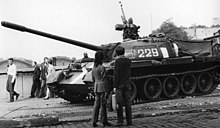| Operation Danube | |||||||
|---|---|---|---|---|---|---|---|
| Part of the Cold War and the Prague Spring | |||||||
 Soviet T-54 in Prague during the invasion | |||||||
| |||||||
| Belligerents | |||||||
|
Logistics support: |
| ||||||
| Commanders and leaders | |||||||
|
|
| ||||||
| Strength | |||||||
|
Initial invasion: 250,000 (20 divisions)[2] 2,000 tanks[3] 800 aircraft Peak strength:[citation needed] 350,000–400,000 Soviet troops, 70,000–80,000 from Poland, Bulgaria and Hungary[4] 6,300 tanks[5] |
235,000 (18 divisions)[6][7] 2,500–3,000 tanks | ||||||
| Casualties and losses | |||||||
|
87 wounded[8] 5 soldiers committed suicide[9] | 137 civilians and soldiers killed,[11] 500 seriously wounded[12] | ||||||
| 70,000 Czechoslovak citizens fled to the West immediately after the invasion. Total number of emigrants before the Velvet Revolution reached 300,000.[13] | |||||||
On 20–21 August 1968, the Czechoslovak Socialist Republic was jointly invaded by four fellow Warsaw Pact countries: the Soviet Union, the Polish People's Republic, the People's Republic of Bulgaria, and the Hungarian People's Republic. The invasion stopped Alexander Dubček's Prague Spring liberalisation reforms and strengthened the authoritarian wing of the Communist Party of Czechoslovakia (KSČ).
About 250,000 Warsaw Pact troops (afterwards rising to about 500,000), supported by thousands of tanks and hundreds of aircraft, participated in the overnight operation, which was code-named Operation Danube. The Socialist Republic of Romania and the People's Republic of Albania refused to participate.[14][15] East German forces, except for a small number of specialists, were ordered by Moscow not to cross the Czechoslovak border just hours before the invasion,[16] because of fears of greater resistance if German troops were involved, due to public perception of the previous German occupation three decades earlier.[17] 137 Czechoslovaks were killed[11] and 500 seriously wounded during the occupation.[12]
Public reaction to the invasion was widespread and divided, including within the communist world. Although the majority of the Warsaw Pact supported the invasion along with several other communist parties worldwide, Western nations, along with socialist countries such as Romania, and particularly the People's Republic of China and People's Republic of Albania condemned the attack. Many other communist parties also lost influence, denounced the USSR, or split up or dissolved due to conflicting opinions. The invasion started a series of events that would ultimately pressure Brezhnev to establish a state of détente with U.S. President Richard Nixon in 1972 just months after the latter's historic visit to the PRC.
Cite error: There are <ref group=lower-alpha> tags or {{efn}} templates on this page, but the references will not show without a {{reflist|group=lower-alpha}} template or {{notelist}} template (see the help page).
- ^ Rea, Kenneth "Peking and the Brezhnev Doctrine". Asian Affairs. 3 (1975) p. 22.
- ^ A Look Back ... The Prague Spring & the Soviet Invasion of Czechoslovakia Archived 29 April 2017 at the Wayback Machine. Central Intelligence Agency. Retrieved on 11 June 2016.
- ^ Cite error: The named reference
washpostwas invoked but never defined (see the help page). - ^ Cite error: The named reference
encywas invoked but never defined (see the help page). - ^ Invaze vojsk Varšavské smlouvy do Československa 21. srpna 1968. armyweb.cz. Retrieved on 11 June 2016.
- ^ Šatraj, Jaroslav. "Operace Dunaj a oběti na straně okupantů". Cтрановедение России (Reálie Ruska). Západočeská univerzita v Plzni. Archived from the original on 8 January 2008. Retrieved 17 November 2015.
- ^ Minařík, Pavel; Šrámek, Pavel. "Čs. armáda po roce 1945". Vojenstvi.cz. Retrieved 17 November 2015.
- ^ "The Soviet War in Afghanistan: History and Harbinger of Future War". Ciaonet.org. 27 April 1978. Archived from the original on 21 May 2012. Retrieved 13 February 2014.
- ^ Jak zemřeli vojáci armád při invazi '68: Bulhara zastřelili Češi, Sověti umírali na silnicích. Hospodářské noviny IHNED.cz. Retrieved on 11 June 2016.
- ^ Skomra, Sławomir. "Brali udział w inwazji na Czechosłowację. Kombatanci?" (in Polish). Agora SA. Retrieved 21 September 2013.
- ^ a b Fraňková, Ruth (18 August 2017). "Historians pin down number of 1968 invasion victims". radio.cz. Archived from the original on 26 August 2017. Retrieved 30 August 2018.
- ^ a b "August 1968 – Victims of the Occupation". ustrcr.cz. Ústav pro studium totalitních režimů. Archived from the original on 18 July 2011. Retrieved 23 June 2011.
- ^ Warsaw Pact invasion of Czechoslovakia Archived 31 July 2017 at the Wayback Machine. European Network Remembrance and Solidarity. Retrieved on 11 June 2016.
- ^ Cite error: The named reference
Romaniawas invoked but never defined (see the help page). - ^ Cite error: The named reference
Albaniawas invoked but never defined (see the help page). - ^ Cite error: The named reference
ddrwas invoked but never defined (see the help page). - ^ Cite error: The named reference
nvatruppenwas invoked but never defined (see the help page).